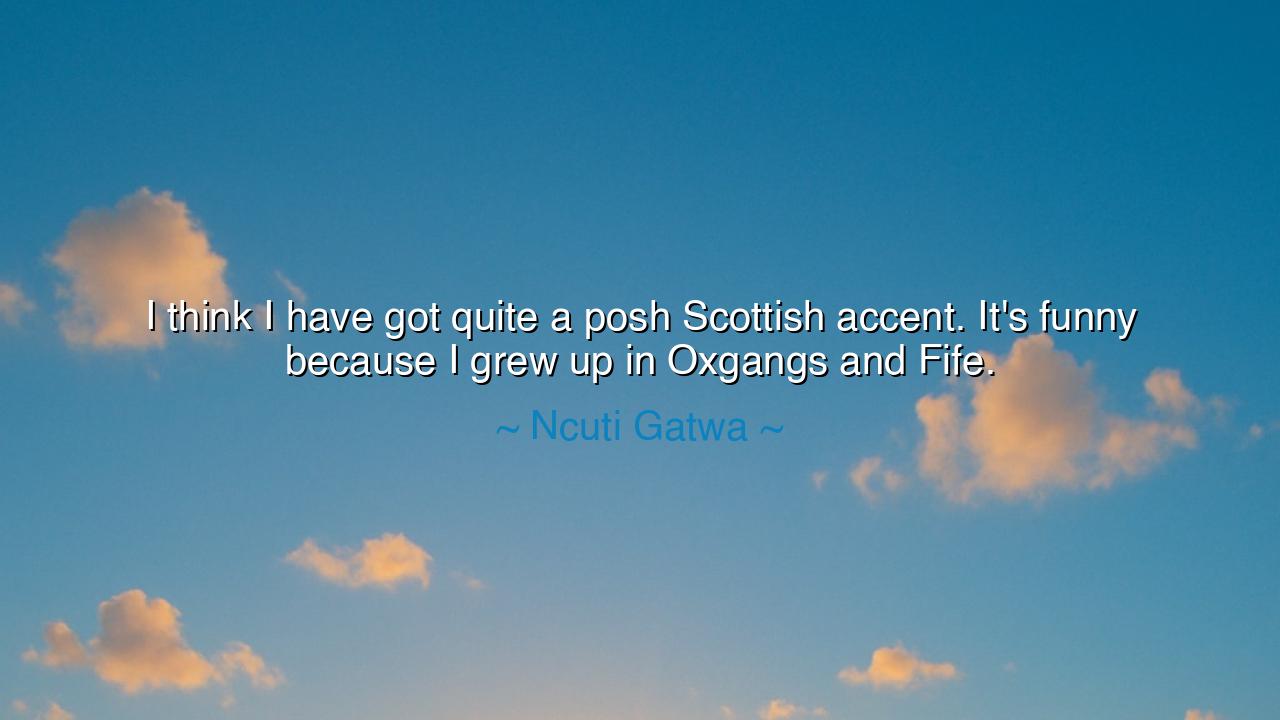
I think I have got quite a posh Scottish accent. It's funny
I think I have got quite a posh Scottish accent. It's funny because I grew up in Oxgangs and Fife.






The words, “I think I have got quite a posh Scottish accent. It’s funny because I grew up in Oxgangs and Fife,” come from Ncuti Gatwa, the Rwandan-born Scottish actor whose rise to international fame reflects not only talent but transformation—the kind that comes from crossing cultures, classes, and continents. Beneath his humor lies a profound meditation on identity, belonging, and the ever-changing voice of selfhood. When he laughs at his own accent, he is not mocking it; he is acknowledging the mysterious way life reshapes us—how our surroundings, our struggles, and our journeys write themselves into our speech, our manner, and our souls.
In the ancient way of wisdom, this saying teaches that a person’s voice is the echo of their journey. Gatwa’s accent, “posh Scottish,” is not a mask he wears but a living symbol of the path he has walked—a path from the humble streets of Oxgangs, a working-class area in Edinburgh, and Fife, the rugged coastal land across the water, to the shining stages of the world. That he finds humor in it shows his awareness of life’s paradox: that one may be shaped by simplicity and yet speak with elegance, born of modest means and yet carry themselves with grace. It is the laughter of one who has transcended boundaries without forgetting their roots.
To the ancients, such laughter was a sign of wisdom. For they knew that identity is not fixed but fluid, like the river that begins in the mountain and ends in the sea. Ncuti Gatwa’s “posh Scottish accent” is not merely a curiosity—it is the voice of a man who has traveled between worlds and made peace with them. His journey mirrors that of countless souls who have risen from humble origins into broader realms, only to discover that the truest strength lies not in denying where one came from, but in uniting all the pieces of one’s story into a single harmony.
Consider the tale of Andrew Carnegie, the Scottish boy who emigrated to America with nothing but hope. In his youth, he worked in factories and mills, his speech rough with the dialect of his homeland. Yet as he rose to power and wealth, his manner softened and his voice changed, not out of vanity but out of adaptation. Still, Carnegie never forgot his beginnings—he built libraries for the poor, schools for the working class, and he spoke often of the pride he carried for Scotland. Like Gatwa, he stood at the meeting point between the humble and the refined, between the accent of his birth and the cadence of his destiny. The true nobility of a person lies not in how they speak, but in what they remember.
Gatwa’s words, humorous though they may be, also reveal the tension between class and authenticity. To sound “posh” is to be heard differently—to command a certain respect in the wider world. Yet the laughter in his tone shows he knows that accents, like status, are often misunderstood symbols. What others may hear as privilege, he knows was born of perseverance. His “posh” accent is not the inheritance of wealth but the reflection of growth—an evolution shaped by experience, education, and self-expression. Thus, he reminds us that transformation does not betray origin; it fulfills it.
There is a great lesson in this for all who feel caught between worlds. Never be ashamed of where you come from, nor of how life has changed you. The voice you carry—whether rough or refined, accented or plain—is the living history of your becoming. The ancients said that to find harmony in oneself is to conquer chaos, and Gatwa’s laughter at his own speech shows that harmony achieved. He can laugh because he belongs to both the streets of Oxgangs and the global stage; his tongue speaks both of hardship and triumph, of Scotland’s working class and the world’s admiration.
So, my child, take this teaching to heart: your voice is your story. It bears the marks of where you have walked and who you have become. Do not silence it to fit the world’s mold, nor mock it to appease its expectations. Instead, cherish it as proof of your journey. Like Ncuti Gatwa, wear it proudly—whether it carries the tones of the village or the vowels of the city. For each note, each inflection, is a testament to the distance you have traveled and the courage it took to arrive.
In the end, Gatwa’s quote is not merely about accents—it is about identity reclaimed with humor and grace. It tells us that growth need not erase the past, and refinement need not deny the roughness that gave it strength. To laugh at the blending of one’s voices is to understand life’s grand comedy: that the soul, like language, evolves—but its essence remains the same. And so, when you speak, let your words ring with pride, for every syllable is a bridge between who you were, who you are, and who you are yet to be.






AAdministratorAdministrator
Welcome, honored guests. Please leave a comment, we will respond soon